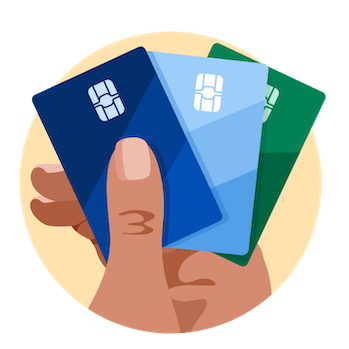Overpaid Credit Card? Here’s What to Do




Paying off your credit card in full every month is a healthy financial habit. Not just in terms of avoiding any accumulated interest, but also for protecting credit score and managing your money. But even careful budgeters can find themselves with an overpaid credit card, on occasion.
Understanding how credit card overpayment happens can help you know how to respond when it happens and avoid it in the future.
» MORE: How to apply for a credit card
What is an overpaid credit card?
If you have a negative credit card balance on your account because you paid more than you owed, it’s what’s known as an overpaid credit card. Normally, a negative balance on a financial account is a bad thing — such as when you overdraft a chequing account.
But in the case of an overpaid credit card, a negative balance can be viewed as a good thing because it means the credit card company technically owes you money.
How to tell if your credit card is overpaid
To determine if you have overpaid your credit card, check your statement or your current account balance online. If you have overpaid your credit card, the excess amount will usually be shown in brackets or parenthesis.
For example, if you overpaid your credit card by $200 then the balance on your statement may show as ($200.00).
You will want to look over your credit card statement to verify that everything is correct and it’s not just an error. You can also call your credit card issuer to confirm. But if all of the transactions look as they should and things match up, the overpaid amount is likely accurate.
How credit card overpayment happens
Overpaying your credit card can happen for a number of different reasons.
The first, and most common reason is that you just overpaid by accident. This could be because you made a typo when entering the payment amount online, or, perhaps you just guessed at the amount owed and overestimated. You can also overpay by accident if you have automatic payments set up but then make an additional manual payment. If both those payments go through, then your account will have a negative balance.
A second way to overpay a credit card is by paying off your bill and then returning something that was charged to the credit card. Normally, that amount would just be deducted from the statement balance. However, in this case, since the bill has been paid, there is no balance from which to deduct, so you end up with a negative balance.
Other things that could lead to an overpaid credit card include:
Adjusted or delayed transactions that didn’t originally show up correctly on your statement.
Reversed fraudulent charges.
Redemption of a cash-back reward that’s larger than the amount owed on your account.
Not all overpaid credit cards are the result of an accident, however; some people choose to do it on purpose. The thinking is that, in certain circumstances, an overpaid credit card temporarily increases your credit limit.
For example, if your credit card has a limit of $5,000 but you have a negative balance of $1,000 then you now have room to charge up to $6,000 on the card.
An overpaid credit card can also be beneficial if you need a cash advance. Typically, cash advances come with very high interest rates and start accruing immediately. However, if you are taking out a cash advance on a negative balance then you can avoid paying any interest.
While overpaying your credit card may work as a “hack” to increase your short-term purchasing power, it’s inefficient as a frequent or a long-term strategy. If you find yourself needing to charge more than your normal credit limit on a regular basis, it’s probably best to reach out to your credit card provider and ask them to increase your credit limit, if possible.
Is it bad to overpay your credit card?
Any overpaid credit card isn’t usually anything to worry about unless you overpaid by a significant amount that could leave you without cash to cover other expenses.
Overpaying your credit card will not have a negative impact on your credit score. Credit utilization is a significant feature of your credit score and you want to keep your utilization ratio as low as possible, ideally, under 30%. Because overpaying your credit card technically reduces your ratio, the impact will likely be neutral or temporarily positive.
Best Credit Cards in Canada
Compare all different credit cards side-by-side and find out the best card that will meet your need with special perks and benefits
What to do about an overpaid credit card
Look over your statement to ensure that everything is correct. As long as things look normal, doing nothing is an option. Your balance will go from negative to zero and then eventually start to rise, probably within the next billing cycle, as you make new purchases.
If you overpaid by a large amount and need that money back, you can request a refund. To do this, get in touch with your credit card issuer and explain the situation. If the issuer’s policies allow for a cash refund, you may receive it by cheque or a direct deposit into your linked bank account, but be aware that it could take several days to get a response, and even longer for the refund to arrive.
DIVE EVEN DEEPER

 Shannon Terrell
Shannon Terrell
 Shannon Terrell
Shannon Terrell
 Shannon Terrell
Shannon Terrell
 Shannon Terrell
Shannon Terrell